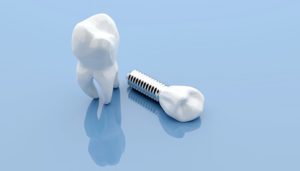What Are Dental Implants Made Of?
July 20, 2018
 There is a lot of hype surrounding dental implants, and rightly so. For many people, they are the best tooth replacement option that modern dentistry has to offer. Still, you might hesitate to hop on the implant bandwagon because you don’t want to have just any old material placed in your jawbone. Let’s talk about what exactly dental implants and their restorations are made of and why these materials work so well with the human body.
There is a lot of hype surrounding dental implants, and rightly so. For many people, they are the best tooth replacement option that modern dentistry has to offer. Still, you might hesitate to hop on the implant bandwagon because you don’t want to have just any old material placed in your jawbone. Let’s talk about what exactly dental implants and their restorations are made of and why these materials work so well with the human body.
Titanium — a Biocompatible Marvel
The vast majority of dental implants are made of a titanium alloy (titanium mixed with minimal amounts of other metals). Titanium is very biocompatible, which means that it works well within the human body and is extremely unlikely to cause any adverse reactions. Some traits of titanium that contribute to its biocompatibility include:
- It is non-toxic and non-magnetic
- It has a low density and a high strength, making it durable but lightweight
- It is non-corrosive
While all of the above factors are huge plusses for titanium, perhaps its most outstanding quality is its ability to osseointegrate, or bond with the tissue around it. When other materials are inserted into the human body, they create an immune response and get attacked by the body. However, because titanium is inert, the body is very unlikely to reject it. What’s even more amazing is that titanium’s properties enable it to adhere to the bone around it. In effect, the human body accepts the titanium implants and welcomes them as part of the jaw’s structure.
Zirconia – a Non-Metal Alternative
Very few patients experience an allergic reaction to titanium, but for those that do, an alternative material is available: zirconia. These ceramic implants are not as strong as their titanium counterparts, and they are more prone to breakage, but they are also biocompatible and can provide a sturdy base for new teeth.
What About Implant Restorations?
We’ve talked about the materials that compose dental implants, but what about the artificial teeth (restorations) that go on top of the implants? Most of them are made out of porcelain, which is the ideal material for replacement teeth for a number of reasons:
- It comes in a wide range of colors, so your Vintage Park dentist can choose a shade for your new teeth that blends in perfectly with your remaining natural pearly whites.
- It reflects light in a manner that is similar to natural teeth.
- It is very strong, able to stand up to all the rigors of everyday life.
Acrylic may be a viable alternative to porcelain. It is also a strong, natural-looking material that is often used for dentures and other forms of tooth restoration.
Dental implants provide the best tooth replacement material. You can be confident that the materials used in them are both strong and biocompatible.
About the Author
Dr. Darrick Castleberry is a general dentist who has undergone extensive training in implant placement and restoration. He has even completed the prestigious Misch Surgical Program, which helped him gain a deeper understanding of many aspects of implant dentistry. If you would like to learn more about how Dr. Castleberry can help you regain your lost smile, contact our office at 281-320-9600.
No Comments »
No comments yet.
RSS feed for comments on this post.
